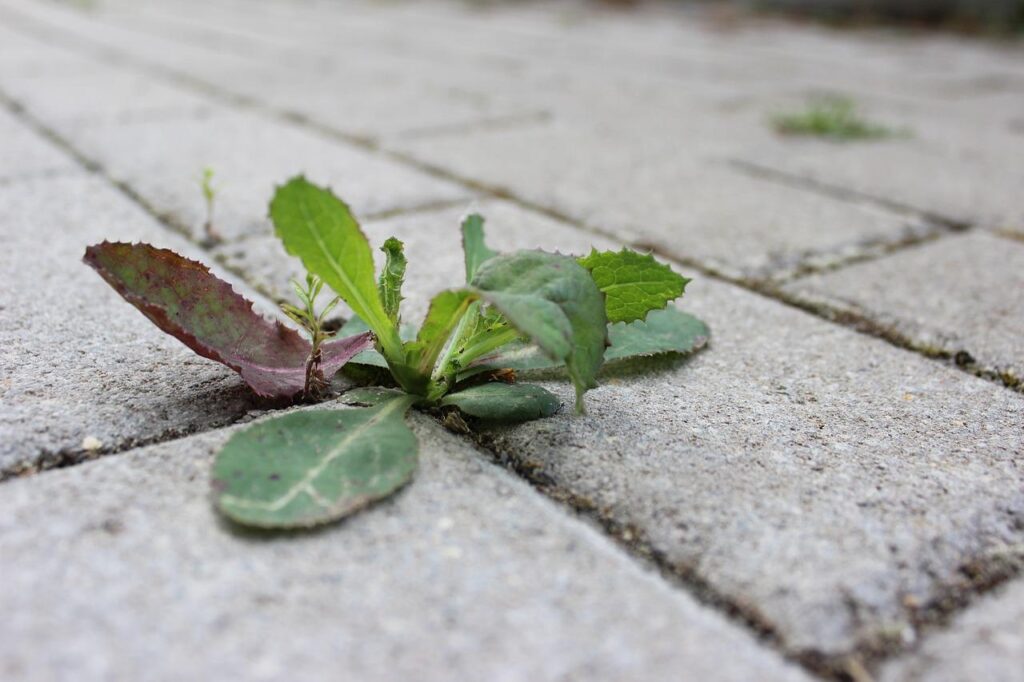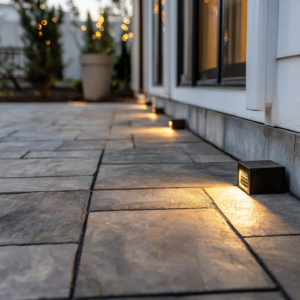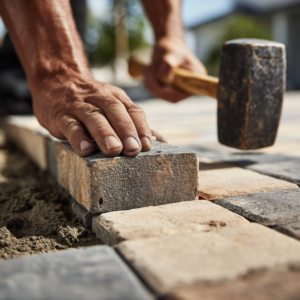Pavers add a sense of elegance and practicality to driveways, patios, and walkways. Yet, anyone who has enjoyed the beauty of a well-laid paver surface knows the frustration that comes when weeds in paver cracks begin to sprout.
When this happens, it feels like an uphill battle – no sooner do you remove them than they seem to return stronger than ever. The good news? You’re not alone in this struggle, and with a better understanding of the issue and the right approach, those pesky weeds in paver cracks can become a thing of the past.
So let’s see right now why weeds appear in paver cracks, explore preventative measures, and discuss effective solutions to maintain a weed-free surface, even amidst a turf-based design.
You may also like: How to kill weeds in driveway pavers – 6 methods to choose from
Jump to:
Weeds in Paver Cracks: Why Does it Happen?
It’s easy to assume that weeds in paver cracks grow because of poor maintenance, but even the most well-kept paver installations can fall victim to unwanted greenery. The reason lies in the natural environment.

Pavers are not a completely sealed surface; they are separated by narrow joints that allow the surface to breathe, expand, and contract with changing weather conditions. These joints are often filled with sand or polymeric sand to keep them stable.
Over time, wind, rain, and foot traffic can cause this sand to settle, leaving tiny gaps that become a haven for weed seeds.
Weeds can infiltrate paver cracks in two main ways:
- Airborne Seeds: Many weed species, such as dandelions and crabgrass, rely on the wind to carry their seeds. When these seeds land in the cracks of your pavers, they can germinate if they find sufficient moisture.
- Existing Soil and Organic Debris: Over time, dirt, dust, and organic matter accumulate in the paver joints, creating a fertile environment for weeds to take root.
While a stray weed or two may seem like a minor annoyance, letting weeds grow unchecked can lead to significant issues.
The first of these issues is serious structural damage. Weeds can grow aggressively, and their roots can push pavers apart, leading to uneven surfaces and compromised stability.
This, of course, ends up causing an aesthetic decline in the entire installation, disrupting what would otherwise be the clean and polished look of a paved surface, detracting from your property’s curb appeal.
Once weeds establish themselves, they spread rapidly, making them harder to manage over time. So addressing weeds early is crucial to preserving both the appearance and functionality of your paved areas.
How to Prevent Weeds in Paver Cracks
As with most home improvement challenges, prevention is better than cure. By incorporating certain strategies into your maintenance routine, you can significantly reduce the likelihood of weeds taking hold.
- Proper Installation: The foundation of any successful paver surface is proper installation. Ensuring that the base layer is compacted and stable, and using high-quality materials, can help prevent the conditions that encourage weed growth.
- Polymeric Sand: Opt for polymeric sand instead of traditional joint sand. Polymeric sand contains a special binder that hardens when activated with water, creating a seal that resists weed growth and prevents sand erosion.
- Regular Cleaning: Periodically sweep and wash your pavers to remove debris, seeds, and organic material. Keeping the surface clean minimizes the chances of weeds germinating in the cracks.
- Sealants: Applying a high-quality sealant not only protects the surface of your pavers from stains and wear but also creates a barrier that discourages weed growth.

How to Remove Existing Weeds in Paver Cracks
Despite your best efforts, you may still find weeds sprouting in paver cracks. When that happens, it’s important to tackle the issue effectively to avoid further spread.
- Hand Pulling: For smaller areas or individual weeds, pulling them out by hand can be effective. However, ensure you remove the entire root system to prevent regrowth.
- Weed Killers: Chemical or organic herbicides can be used for larger infestations. When selecting a product, look for one that is safe for pavers and surrounding plants.
- Power Washing: A pressure washer can remove weeds and their roots from paver cracks, but it may also displace the joint sand, which will need to be replaced afterward.
- Burning: Flame weeders are another option for quickly eliminating weeds, though caution is needed to avoid damaging your pavers or surrounding areas.
After removing the weeds, it’s essential to refill the paver joints with sand and consider applying a sealant to prevent the issue from recurring.

Why Long-Term Maintenance Matters for Weed-Free Pavers
Consistency is key to maintaining a weed-free paver surface. Regular inspection and maintenance can save you time and effort in the long run. Be proactive in addressing small problems before they escalate, and don’t hesitate to consult a professional if you notice persistent issues.
Professional hardscaping services can provide expert guidance and solutions tailored to your specific needs, ensuring that your pavers remain a source of pride and enjoyment for years to come.
Weeds in paver cracks may be a common problem, but they don’t have to be a permanent one. By understanding the underlying causes and adopting the right strategies, you can keep your outdoor spaces looking clean, polished, and inviting.
If you’re looking for expert assistance in preventing or addressing weed issues in your pavers, consider reaching out to a professional hardscaping service like we have here!
If you happen to be around Sarasota County, in Fl, we here at JS Brick are ready to help you. With years of experience and a commitment to quality, we specialize in creating and maintaining beautiful, durable outdoor spaces that stand the test of time.
Don’t let weeds diminish the beauty and functionality of your pavers. Contact JS Brick Corporation today to learn how we can help you achieve a lasting, weed-free solution.



